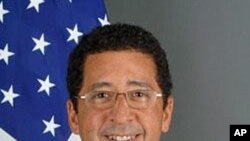“There is a new source of energy which is really a primary focus of the State Department right now,” said David Goldwyn, U.S. State Department Coordinator for International Energy Affairs. “And that’s natural gas.”
In a wide-ranging interview with VOA, Goldwyn says natural gas from shale is an excellent source of energy for many nations “so they’re not dependent on one country or one pipeline.”
The State Department will hold a conference in Washington in late August 2010 to discuss expanding the safe use of shale gas. More than a dozen countries, including India, China and Pakistan, are slated to attend. In addition to helping the United States wean itself from its dependence on oil, the Obama administration believes that increased shale gas development will help reduce greenhouse gas emissions.
Other studies have also concluded that increased shale gas production in the United States and Canada could also help lower the price currently charged by Russia and Persian Gulf countries.
“This is not only a huge boon for energy security and economic development,” said Goldwyn, “but also, potentially for climate security if countries are able to move away from older coal plants and to natural gas instead.”
As Coordinator for International Energy Affairs at the State Department, David Goldwyn is at the center of U.S. energy security policy. His office supports initiatives that reduce U.S. dependence on foreign oil and also mitigate the impact of climate change. Secretary of State Hillary Clinton created the office to demonstrate the importance of energy security to U.S. foreign policy. Goldwyn’s office provides technical assistance to the central banks and finance ministries of several oil-producing countries to improve transparency and accountability in their oil revenues. Specifically, Washington is helping newer oil producers such as Liberia, East Timor and Papua New Guinea to manage and maximize resource revenues for more equitable economic development. By aiding these countries, the United States creates greater political stability overseas, which in turn, bolsters energy security for all.
“Transparency maximizes value,” Goldwyn says. “Transparency makes for stable governments.”
David Goldwyn underscores that the United States’ overarching energy security goal is to reduce dependence on oil and other fossil fuels while at the same time promoting economic development, protecting markets, and creating more jobs through researching and developing alternative sources of energy such as nuclear and bio-fuels and electric batteries for cars.








